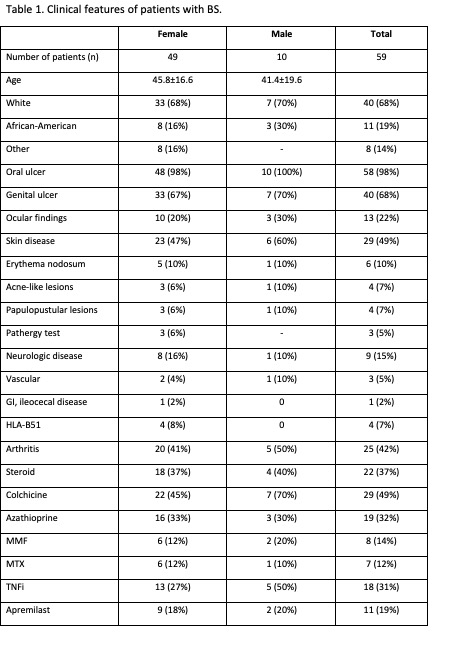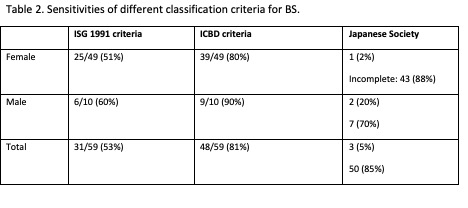Session Information
Session Type: Poster Session B
Session Time: 10:30AM-12:30PM
Background/Purpose: The diagnosis of Behcet’s Disease (BD) is particularly challenging in non-endemic areas because of milder disease presentations and lack of specific tests. Prior studies have shown that utilization of the available classification criteria often led to overdiagnosis in non-endemic areas. Our goal was to evaluate the performance of the three BD classification criteria in North America, a low-prevalence area.
Methods: A retrospective chart review was performed between 2014-2024. We searched our local EMR system by using the terms “Behcet”, Behcet’s syndrome” and “Behcet’s disease”. In addition, we used ICD-10 code for BS (ICD-M35.2). Clinical data were obtained from electronic health records. ISG 1990, ICBD 2014 and Japanese Society criteria were applied to our patients with a clinical diagnosis of BD.
Results: The initial search yielded 205 patients. In 146 patients, alternate diagnosis was deemed more plausible and were excluded. The major manifestations of these groups were oral ulcer (94%), genital ulcers (57%) and ocular disease (26%). We further analyzed 59 patients with a clinical diagnosis of BS as summarized in Table 1. Most were female (83%) and the mean age was 45.1±17.40. Majority of the patients were White (68%).
Table 2 shows the sensitivity of available classification criteria against clinically diagnosed BD. 53% patients fulfilled ISG 1990 and 81% fulfilled ICBD criteria. Both criteria had higher sensitivity for male patients with BD. The sensitivity of Japanese criteria was very low, especially in females (only 2%). Incomplete Japanese criteria showed 85% sensitivity. The most common treatment modalities were colchicine 29 (49%), steroids 22 (37%) and azathioprine 19 (32%). 18 (31%) patients used TNFi and 11 (19%) patients used Apremilast. During the follow-up, the initial diagnosis of BD was revised to lupus in 3, and inflammatory bowel disease in 2 patients. Malignancy and relapsing polychondritis developed in one patient. Coronary artery aneurysm and CNS disease was detected in one patient. Our chart review did not reveal any severe visual loss or mortality.
Conclusion: Our cohort showed higher female predominance, low major organ involvement, low prevalence of HLA- B51, and low mortality. The sensitivity of ISG was lower than ICBD criteria for diagnosis of BD, especially in female patients. The complete Japanese criteria had a poor sensitivity in both males and females.
To cite this abstract in AMA style:
Shamim M, Allouni M, Chaudhary H, Pamuk O. The Performance of Behcet’s Disease Clinical Diagnostic Criteria in a Low Prevalence Region. A Retrospective Single Center Cohort Study [abstract]. Arthritis Rheumatol. 2024; 76 (suppl 9). https://acrabstracts.org/abstract/the-performance-of-behcets-disease-clinical-diagnostic-criteria-in-a-low-prevalence-region-a-retrospective-single-center-cohort-study/. Accessed .« Back to ACR Convergence 2024
ACR Meeting Abstracts - https://acrabstracts.org/abstract/the-performance-of-behcets-disease-clinical-diagnostic-criteria-in-a-low-prevalence-region-a-retrospective-single-center-cohort-study/


